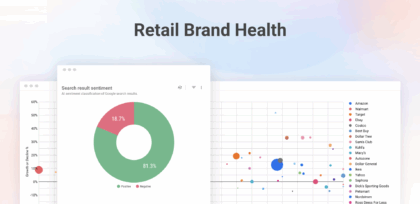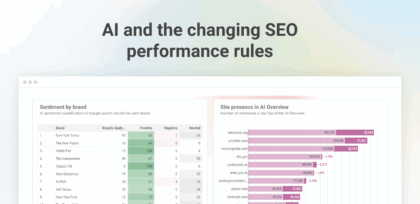Why you should be thinking about sustainable retail this Christmas
10 Dec 2018|3 MIN READ
Christmas. A time for unbridled (ill-judged) gifts, ample (awkward) familial contact and a spot of overindulgence (food comas). Whatever way you look at it, Christmas is a season of excess. And with excess comes waste. In fact - and sorry to take on the role of ole Ebenezer here - it seems there isn’t one part of Christmas that doesn’t come at the expense of the planet.
But, with David Attenborough’s ocean plastics expose, Stacey Dooley’s throwaway fashion investigation and Meghan Markle’s public appearances in eco-friendly only clothing, there is clearly a growing trend towards sustainability, and we’re beginning to see this online in search. Will attitudes shift further over the Christmas season? Who is prepared in each growing niche? And how can retailers turn this into their greatest opportunity in 2019?
It’s cool to be ethi-cool
Taking a look at Christmas related retail goods via Pi Market Intelligence, we can see that there is clear uplift across sustainable Christmas searches. Sustainable decorations are seeing subtle YOY uplift, while gift wrap and cards saw huge uplift between 2016 - 2017, and is peaking earlier YOY.
FYI: We added the following suffixes and prefixes to standard Christmas decorations and merchandise:
Ecofriendly, plastic free, biodegradable, recyclable, reusable, sustainable, environmentally friendly, zero waste, ethical, glitter free etc.
Gift wrap and cards
Wrapping paper: Contrary to popular belief, the majority of the wrapping paper manufactured isn’t recyclable because it’s coated with plastic. And yet, every Christmas in the UK we throwaway enough wrapping paper to circle the entire globe nine times. That is a crazy amount of waste! And, considering that plastic takes 450 years to break down, a devastating blow to the environment.
To offset this, more and more people are seeking out environmentally friendly alternatives to wrapping paper; some searching ‘biodegradable wrapping paper’, ‘compostable wrapping paper’ and ‘recyclable wrapping paper’.
Glitter: This is also notoriously bad, both in the sense that it’s detrimental to the environment and that It. Gets. Everywhere. As a form of micro-plastic, it can find its way into the ocean and into the creatures that inhabit it; currently a third of UK fish have consumed a microplastic.
Search growth shows that we are becoming more conscious of this, shifting towards glitter-free gift wrap and products.
Decorations
Christmas trees: This emblematic feature of Christmas is a point of contention. Six million trees are thrown away every year. When sent to landfill, they decompose and produce methane. Artificial christmas trees also comes at the expense of the environment, and can only be eco-friendly if used for 8–10 years.
As a result of growing awareness, people are looking to change their xmas habits; searching for sustainable christmas trees, and homegrown trees for replanting.
Who’s stolen Christmas?
Lights4Fun is the star of the sustainability tree, with 10.6% share across decorations. This is likely due to its dominance across LED light bulbs, which are energy efficient and long-lasting alternatives to standard bulbs.
Hot on its heels is high street retailer, Argos, with 8.63% share. (Oh the Argos Christmas catalogue 💖) It seems like this retailer has got every element of Christmas cracke(re)d.
A crafty Christmas
A couple of ecommerce craft sites and alternative marketplaces appear in this share of voice snapshot, including Hobbycraft and Etsy.
You only have to look at YouTube ‘How to’ videos or Instagram’s discovery feed to see the growing trend towards DIY, crafts and homemade decorations.
With sustainability and ethicality becoming a priority in many households, the craft sector will undoubtedly see growth as consumers shift focus from spending to conserving.
They’re making a list, they’re checking it twice
The search landscape is also made up of publications (BBC, Glamour) and information sites like Recycle Now (position 3), suggesting that consumers are researching for things to add to their sustainable Christmas lists.
Retailers and brands can take advantage of this by creating relevant and informative content to meet their customers during the research and consideration phase, potentially with links to any ethical products in their inventory.
To wrap up...
Although still a relatively small niche, the topic of sustainability is undoubtedly gaining momentum and filtering into mainstream conscious.
For those who embrace it, it’s a subject they’re increasingly involved in, feel strongly about, and factor in to multiple areas of their lives.
Retailers seizing this opportunity can capture the interest of customers across multiple verticals and use it as a starting point for building meaningful relationships. These are the retailers that will undoubtedly benefit for Christmases to come.
The charts featured in this article are taken from Pi Market intelligence. Want to spot new consumer trends and see your dominance across a growing niche? Get in touch for your demo.
Never miss a post
Join our mailing list and have our SEO news delivered straight to your inbox.




